

10 Symptoms of Kidney Disease. Polycystic Kidney Disease - Symptoms, Diagnosis, Treatment of Polycystic Kidney Disease. Symptoms of Kidney Disease. It is not uncommon for people to lose up to 70 percent of their kidney function before developing any symptoms.
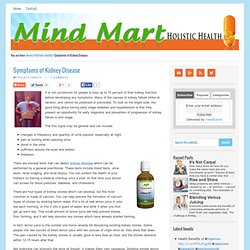
Many of the causes of kidney failure strike at random, and cannot be predicted or prevented. To look on the bright side, the good thing about having early stage diabetes and hypertension is that they present an opportunity for early diagnosis and prevention of progression of kidney failure to end stage. The first signs may be general and can include: Patient Comments: Kidney Failure - Symptoms at Onset of Disease - Viewers Share Their Medical Experiences on MedicineNet.
Diet and nutrition - DaVita. Last Symptoms of Kidney Failure. Kidney Failure Diet, Treatments, Symptoms, Causes. Search Results For: Kidney Failure. National Kidney Foundation: A to Z Health Guide. The National Kidney Foundation is the leading organization in the U.S. dedicated to the awareness, prevention and treatment of kidney disease for hundreds of thousands of healthcare professionals, millions of patients and their families, and tens of millions of Americans at risk.
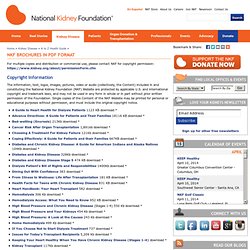
The Better Business Bureau Wise Giving Alliance Charity Seal provides the giving public with an easily recognizable symbol which certifies that the National Kidney Foundation meets the comprehensive standards of America's most experienced charity evaluator. Our Privacy Policy © 2013 National Kidney Foundation, Inc., 30 East 33rd Street, New York, NY 10016, 1-800-622-9010. We subscribe to the HONcode principles of the Health on the Net Foundation. National Kidney Foundation.
Kidney Cleanse at Home. Kidneys are very important parts of the human body as they regulate blood pressure, filter blood, and expel wastes from the system.
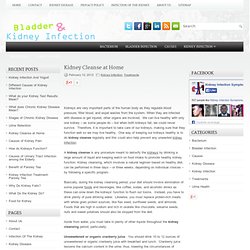
When they are infected with disease or get injured, other organs are involved. We can live healthy with only one kidney – as some people do – but when both kidneys fail, we could never survive. Therefore, it is important to take care of our kidneys, making sure that they function well so we may live healthy.
10 Symptoms of Kidney Disease. Many people don’t even know that they suffer from kidney disease until it’s at a chronic stage.
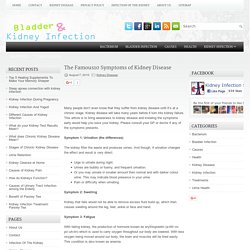
Kidney disease will take many years before it turn into kidney failure. This article is to bring awareness to kidney disease and knowing the symptoms early would help you save your kidney. Please consult your GP or doctor if any of the symptoms presents. Symptom 1: Urination (the differences) The kidney filter the waste and produces urines. Urge to urinate during night.Urines are bubbly or foamy, and frequent urination.Or you may urinate in smaller amount then normal and with darker colour urine. Symptom 2: Swelling Kidney that fails would not be able to remove excess fluid build up, which then causes swelling around the leg, feet, ankle or face and hand. Symptom 3: Fatigue With failing kidney, the production of hormone known as erythropoietin (a-rith’-ro-po’-uh-tin) which is used to carry oxygen throughout our body are lowered. Symptom 4: Itching and Skin Raches. Signs and symptoms of kidney disease. Many people who have chronic kidney disease don't know it, because the early signs can be very subtle.
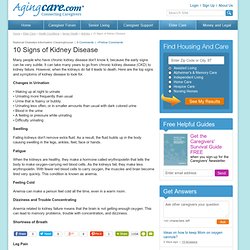
It can take many years to go from chronic kidney disease (CKD) to kidney failure. However, when the kidneys do fail it leads to death. Here are the top signs and symptoms of kidney disease to look for. Changes in Urination • Waking up at night to urinate • Urinating more frequently than usual • Urine that is foamy or bubbly • Urinating less often, or in smaller amounts than usual with dark colored urine • Blood in the urine • A feeling or pressure while urinating • Difficulty urinating Swelling Failing kidneys don't remove extra fluid. Sodium In Chips. A handful of crispy and salty potato or tortilla chips is a common accompaniment to sandwiches or grilled burgers.

Processed and prepared foods, such as chips, are the main source of salt in the average diet. If you are trying to limit how much sodium you consume each day, learning more about the salt content of chips may help you make healthier and lower sodium choices. The average person consumes 3,400 mg of sodium per day, which can have negative health ramifications. If you take in more sodium than your kidneys are able to eliminate, it begins to accumulate in your blood. When you have more sodium in your body than you need, you may begin to retain water and become bloated. The average diet would benefit from a reduction in sodium intake. While some potato and tortilla chip brands come in low-sodium varieties, the majority of your chip options contain a large amount of sodium per 1-oz. serving.
If you must have chips, stick to a 1-oz. serving. How To Measure Sodium Levels. Sodium is essential for life, but can cause serious health issues if you consume too much.
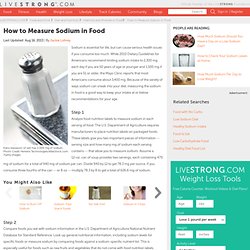
While 2010 Dietary Guidelines for Americans recommend limiting sodium intake to 2,300 mg each day if you are 50 years of age or younger and 1,500 mg if you are 51 or older, the Mayo Clinic reports that most Americans consume about 3,400 mg. Because of the variety of ways sodium can sneak into your diet, measuring the sodium in food is a good way to keep your intake at or below recommendations for your age. 10 Symptoms Of Kidney Disease. If you are diagnosed with renal disease--commonly called kidney disease--it is important to understand all the possible symptoms that can occur.
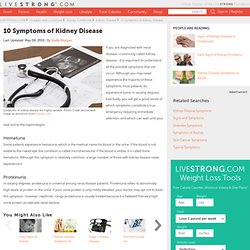
Although you may never experience the majority of these symptoms, most patients do experience some, in varying degrees. Eventually, you will get a good sense of which symptoms constitute a true emergency requiring immediate attention, and which can wait until your next visit to the nephrologist. Some patients experience hematuria, which is the medical name for blood in the urine. If the blood is not visible to the naked eye, the condition is called microhematuria. 10 Warning Signs You Might Have Kidney Disease. Kidney Disease Info. When people are told they have chronic kidney disease (CKD), the first questions they often have are "How long will I live?
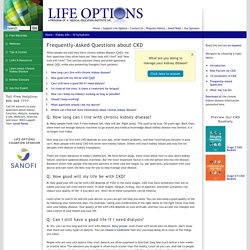
" and "How well will I live? " This section answers these and other questions about CKD, while also presenting thoughts from patients. Q: How long can I live with chronic kidney disease? A: Many people think that if their kidneys fail, they will die. Right away. How long you can live with CKD depends on your age, other health problems, and how involved you become in your care. There are major advances in today's healthcare.
Starting Dialysis: What You Need to Know. Starting Dialysis: What You Need to Know By Charlotte Szromba, MSN, CNN, APRN-BC When to start kidney replacement therapy (KRT)Currently chronic kidney disease (CKD) is classified into five stages based on a common measure of kidney function which is the estimated glomerular filtration rate (eGFR).

It is the rate kidneys are able to filter out waste from the blood and is based on the creatinine value in the blood, age, race and gender (NKF, 2002). Normal eGFR is 125 mL/min and a lower GFR means a loss of kidney function. We will concentrate on stages 4 and 5. I Hate Dialysis Message Board - Index.
Anemia And Kidney Disease: What You Should Know (Kidney Beginnings) Need Kidney, No Donor - National Kidney Registry - Facilitating Living Donor Transplants. Welcome! Based on your situation, you need a kidney and may not have a living donor. You have two basic options: (1) get a deceased donor transplant, or (2) find a living donor by conducting a living donor search. We suggest you do both. Deceased Donor Transplant Although the wait time for deceased donor kidneys is reported to be long and getting longer, there are transplant centers in the United States where median wait times are less than a third of the national average. For wait time information at transplant centers, go to the website of the Scientific Registry of Transplant Recipients www.ustransplant.org/csr/current/csrDefault.aspx.
Another good source of wait list information is the Organ Procurement and Transplantation Network www.optn.org/latestData/step2.asp. Living Donor Transplant In addition to pursuing a deceased donor transplant, you may also want to conduct a living donor search. Create a team for the donor search and transplant process. HITSG Patient Portal.